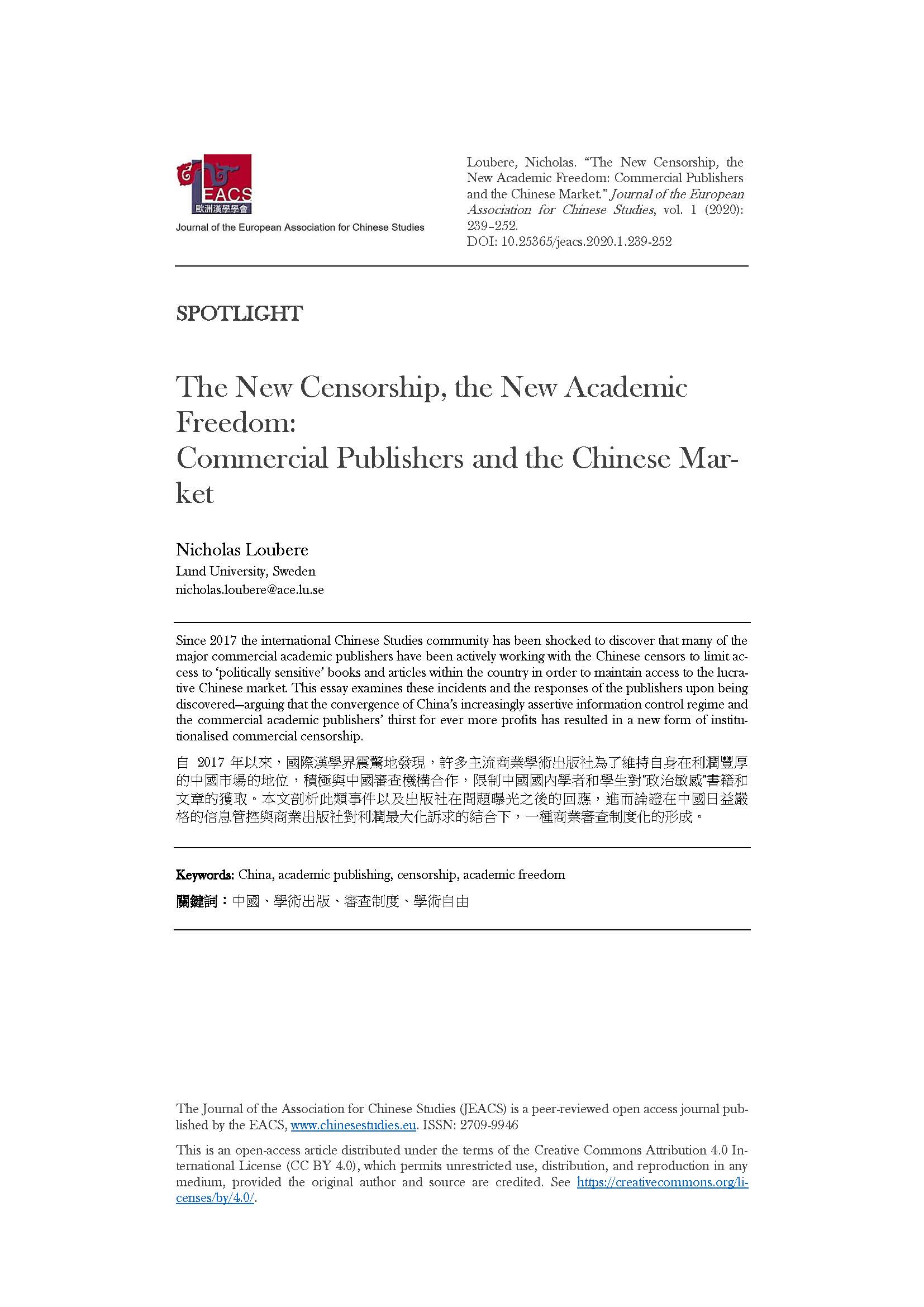The New Censorship, the New Academic Freedom
Commercial Publishers and the Chinese Market
DOI:
https://doi.org/10.25365/jeacs.2020.1.239-252Keywords:
China, academic publishing, censorship, academic freedom, 中國, 學術出版, 審查制度, 學術自由Abstract
Since 2017 the international Chinese Studies community has been shocked to discover that many of the major commercial academic publishers have been actively working with the Chinese censors to limit access to ‘politically sensitive’ books and articles within the country in order to maintain access to the lucrative Chinese market. This essay examines these incidents and the responses of the publishers upon being discovered—arguing that the convergence of China’s increasingly assertive information control regime and the commercial academic publishers’ thirst for ever more profits has resulted in a new form of institutionalised commercial censorship.
自2017年以來,國際漢學界震驚地發現,許多主流商業學術出版社為了維持自身在利潤豐厚的中國市場的地位,積極與中國審查機構合作,限制中國國內學者和學生對"政治敏感"書籍和文章的獲取。本文剖析此類事件以及出版社在問題曝光之後的回應,進而論證在中國日益嚴格的信息管控與商業出版社對利潤最大化訴求的結合下,一種商業審查制度化的形成。
Downloads
References
Association of American Universities, Group of Eight, League of European Research Universities, and Chinese 9 Universities. 2013. “Hefei Statement on the Ten Characteristics of Contemporary Research Universities.” The League of European Research Universities. Retrieved December 14, 2020. https://www.leru.org/publications/hefei-statement.
Brill. 2017. “Brill Asia Opens a Branch Office in Beijing.” September 1, 2017. Retrieved December 14, 2020. https://brill.com/newsitem/10/brill-asia-opens-a-branch-office-in-beijing.
Grose, Timothy. 2019. “How an Academic Journal Censored My Review on Xinjiang.” China Channel (blog). May 13, 2019. Retrieved December 14, 2020. https://chinachannel.org/2019/05/13/oil-water/.
Kennedy, Maev, and Tom Phillips. 2017. “Cambridge University Press Backs down Over China Censorship.” The Guardian, August 21, 2017, sec. Education. Retrieved December 14, 2020. https://www.theguardian.com/education/2017/aug/21/cambridge-university-press-to-back-down-over-china-censorship.
Kwon, Diana. 2018. “Universities in Germany and Sweden Lose Access to Else-vier Journals.” The Scientist Magazine, July 19, 2018. Retrieved December 14, 2020. https://www.the-scientist.com/news-opinion/universities-in-germany-and-sweden-lose-access-to-elsevier-journals--64522.
Lange, Jasmin. 2019. “How a Journal Censored My Review on Xinjiang (7).” MCLC Resource Center. June 26, 2019. Retrieved December 14, 2020. https://u.osu.edu/mclc/2019/06/26/how-a-journal-censored-my-review-on-xinjiang-7/.
Loubere, Nicholas, and Ivan Franceschini. 2017. “Beyond the Great Paywall: A Lesson from the Cambridge University Press China Incident.” Made in China: A Quarterly on Chinese Labour, Civil Society, and Rights 2 (3): 64–66. http://press-files.anu.edu.au/downloads/press/n6784/pdf/beyond_great_paywall.pdf.
McKenzie, Linday. 2019. “UC Drops Elsevier.” Inside Higher Ed, March 1, 2019. Retrieved December 14, 2020. https://www.insidehighered.com/news/2019/03/01/university-california-cancels-deal-elsevier-after-months-negotiations.
MCLC. 2018. “Protest Against Springer Bowing to Censorship.” MCLC Resource Center. October 4, 2018. Retrieved December 14, 2020. http://u.osu.edu/mclc/2018/10/04/protest-against-springer-bowing-to-censorship/.
Monbiot, George. 2018. “Scientific Publishing Is a Rip-Off. We Fund the Re-search – It Should Be Free.” The Guardian, September 13, 2018, sec. Opinion. Retrieved December 14, 2020. https://www.theguardian.com/commentisfree/2018/sep/13/scientific-publishing-rip-off-taxpayers-fund-research.
Phillips, Tom. 2017. “Cambridge University Press Accused of ‘Selling Its Soul’ Over Chinese Censorship.” The Guardian, August 19, 2017, sec. World news. retrieved December 14, 2020. https://www.theguardian.com/world/2017/aug/19/cambridge-university-press-accused-of-selling-its-soul-over-chinese-censorship.
Pils, Eva, and Marina Svensson. 2019. “Academic Freedom: Universities Must Take a Stance or Risk Becoming Complicit with Chinese Government Interference.” The Conversation (blog). June 14, 2019. Retrieved December 14, 2020). http://theconversation.com/academic-freedom-universities-must-take-a-stance-or-risk-becoming-complicit-with-chinese-government-interference-118001.
Redden, Elizabeth. 2018a. “Book Publishers Part Ways with Springer Nature Over Concerns About Censorship in China.” Inside Higher Ed, October 3, 2018. Retrieved December 14, 2020. https://www.insidehighered.com/news/2018/10/03/book-publishers-part-ways-springer-nature-over-concerns-about-censorship-china.
Redden, Elizabeth. 2018b. “More Chinese Censorship of International Journals.” December 21, 2018. Retrieved December 14, 2020. https://www.insidehighered.com/quicktakes/2018/12/21/more-chinese-censorship-international-journals.
Redden, Elizabeth. 2019a. “Brill Severs Ties With Chinese Publisher.” Inside Higher Ed, April 29, 2019. Retrieved December 14, 2020. https://www.insidehighered.com/quicktakes/2019/04/29/brill-severs-ties-chinese-publisher.
Redden, Elizabeth. 2019b. “X-Ing Out Xinjiang.” Inside Higher Ed, May 20, 2019. Retrieved December 14, 2020. https://www.insidehighered.com/news/2019/05/20/another-alleged-case-censorship-roils-china-studies.
Reuters. 2017a. “LexisNexis Withdrew Two Products from Chinese Market.” Reuters, August 22, 2017. Retrieved December 14, 2020. https://www.reuters.com/article/us-china-censorship-journal-lexisnexis-idUSKCN1B21D6.
Reuters. 2017b. “Springer Nature Blocks Access to Certain Articles in China.” Reuters, November 1, 2017. Retrieved December 14, 2020. https://www.reuters.com/article/us-china-censorship/springer-nature-blocks-access-to-certain-articles-in-china-idUSKBN1D14EB.
SCMP. 2017. “At Beijing Book Fair, Publishers Admit to Self-Censorship.” South China Morning Post, August 24, 2017. Retrieved December 14, 2020. https://www.scmp.com/news/china/policies-politics/article/2108095/beijing-book-fair-publishers-admit-self-censorship-keep.
Scott, Joan Wallach. 2019. Knowledge, Power, and Academic Freedom. New York: Columbia University Press.
Shepherd, Christian. 2018. “British Publisher Pulls Academic Journals from Chi-na After Government Complaint.” Reuters, December 24, 2018. Retrieved December 14, 2020. https://uk.reuters.com/article/uk-china-censorship-idUKKCN1ON0HU.
Taylor & Francis. 2018. “Taylor & Francis Social Sciences and Humanities Library | Statement.” Taylor & Francis Newsroom. December 20, 2018. Retrieved December 14, 2020. https://newsroom.taylorandfrancisgroup.com/taylor-francis-social-sciences-and-humanities-library/.
Wong, Lorraine, and Jacob Edmond. 2019. “Three New Essays on the Chinese Script and a New Twist to the Old Problem of Censorship in Chinese Studies.” Make It the Same: Poetry in the Age of Global Media (blog). April 17, 2019. Retrieved December 14, 2020. https://makeitthesame.home.blog/2019/04/18/three-new-essays-on-the-chinese-script-and-a-new-twist-to-the-old-problem-of-censorship-in-chinese-studies/.

Downloads
Published
Versions
- 2020-12-30 (2)
- 2021-03-07 (1)
How to Cite
Issue
Section
License
Copyright (c) 2021 The Journal of the European Association for Chinese Studies

This work is licensed under a Creative Commons Attribution 4.0 International License.
